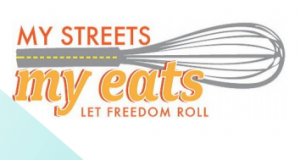Should the city of Chicago be allowed to turn business districts into No-Vending Zones to protect brick-and-mortar restaurants from competition?

That is the question that surrounds a major grassroots campaign being launched today—My Streets! My Eats!— by the Institute for Justice Clinic on Entrepreneurship at the University of Chicago Law School. The Clinic, which brings together law students to assist low-income entrepreneurs, will advocate for freedom for mobile chefs to prepare food on-the-go and serve their customers wherever they can do so safely.
The Clinic will hold a strategy session that is open to all vendors, law students, advocates and members of the media on Tuesday, August 30, 7:00-8:30 pm at the University of Chicago Law School, 6020 S. University Ave., Room V. The meeting will bring together the creative entrepreneurs who are being crippled by Chicago’s restrictive rules so they can share their concerns and develop a plan of action.
Chicago officials have been ticketing and even arresting vendors simply for serving their customers. The current laws about serving food on the move are needlessly restrictive: mobile food businesses can only serve food that was finished and wrapped up in a kitchen, they cannot sell earlier than 10 a.m., and they cannot stop within 200 feet of restaurants.
“In Chicago it is illegal to put toppings on a hot dog from a cart, it is illegal to have a doughnut truck serving breakfast, and it is illegal for a truck or a cart to be just about anywhere in the Loop,” said Beth Milnikel, the director of the IJ Clinic on Entrepreneurship. “Chicago entrepreneurs should not be living in fear, terrified that they’ll be arrested for selling tamales to their neighbors.”
An ordinance allowing food preparation has been introduced, but the city council has delayed discussing it for a year, and the ordinance still contains confusing, anti-competitive requirements. The IJ Clinic has an infographic map showing that the unfair favoritism of the proposed law would block mobile food businesses from business districts.
The campaign continues the Institute for Justice’s National Street Vending Initiative, a nationwide effort to vindicate the right of street vendors to earn an honest living. Earlier this year, El Paso, Texas, repealed its protectionist vending regulations in response to an IJ lawsuit. In July, the Institute filed a similar lawsuit in Atlanta and released a national report, “Streets of Dreams,” which reviews vending laws in America’s 50 largest cities.
Street vending has been an important part of American culture for centuries and is now more popular than ever. The Economist magazine predicted that this year “some of the best food Americans eat may come from a food truck.” For generations, street vending has been a classic way for entrepreneurs to provide for themselves and their families while creating jobs and satisfying customer demands.
Chicago is not the only city stifling vendors with burdensome laws. “Streets of Dreams” shows that 45 of America’s 50 largest cities put real barriers in the way of street vendors. For instance:
- 33 cities have established No-Vending Zones, which often include potentially lucrative areas such as downtown or areas near sporting venues.
- 20 cities ban vendors from setting up near brick-and-mortar businesses that sell the same or similar goods.
- 19 cities permit mobile vendors to stay in one spot for only small amounts of time, forcing vendors to spend much of their day moving instead of selling.
- 5 cities prevent mobile vendors from stopping and parking unless flagged by a customer.
“Our ‘My Streets! My Eats!’ Campaign is working to dismantle these needless regulations and help make Chicago a great place to live, eat, work and dream,” said Milnikel. “We are encouraging all Chicagoans to call their aldermen and say they want Chicago to be a place where mobile chefs are free to prepare food on the go, and serve it all over the city.”
For more on today’s campaign and the National Street Vending Initiative, visit http://www.ij.org/mystreets. The Institute for Justice is the nation’s leading legal advocate for the rights of entrepreneurs. IJ is available on Facebook, YouTube and twitter.



Connect with Us